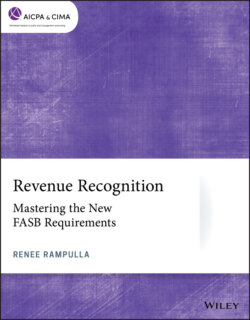Читать книгу Revenue Recognition - Renee Rampulla - Страница 34
Collectability
ОглавлениеAn entity is required to assess whether it is probable that they will collect substantially all of the consideration they will be entitled to in exchange for the goods or services that will be transferred to the customer. Keep in mind that part of identifying whether a contract with a customer exists is based on the entity’s assessment of whether the customer has the ability and the intention to pay the consideration in exchange for the goods or services being transferred. The objective of this assessment is to evaluate whether there is a substantive transaction between the entity and the customer, which is a necessary condition of step 1.
The collectability assessment is partly a forward-looking assessment. This means that an entity should consider all of the facts and circumstances, including customary business practices and the entity’s knowledge of their customer, when determining whether it is probable that they will collect substantially all of the consideration to which they are entitled. Keep in mind that the assessment is not necessarily based on the customer’s ability and intention to pay the entire amount of promised consideration for the entire duration of the contract. When making this assessment, an entity should determine whether the contractual terms and its customary business practices indicate that the entity’s exposure to credit risk is less than the entire consideration promised in the contract because the entity has the ability to mitigate its credit risk. Examples of contractual terms or customary business practices that might mitigate the entity’s credit risk include the following:
In some contracts, payment terms limit an entity’s exposure to credit risk. For example, a customer may be required to pay a portion of the consideration promised in the contract before the entity transfers promised goods or services to the customer. In those cases, any consideration that will be received before the entity transfers promised goods or services to the customer would not be subject to credit risk.
An entity may limit its exposure to credit risk if it has the right to stop transferring additional goods or services to a customer in the event that the customer fails to pay consideration when it is due. In those cases, an entity should assess only the collectability of the consideration to which it will be entitled in exchange for the goods or services that will be transferred to the customer on the basis of the entity’s rights and customary business practices. Therefore, if the customer fails to perform as promised and, consequently, the entity would respond to the customer’s failure to perform by not transferring additional goods or services to the customer, the entity would not consider the likelihood of payment for the promised goods or services that will not be transferred under the contract.
